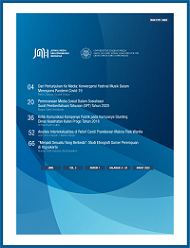Dinamika Online Persona Akun Anonim Twitter Penggemar KPop
Kirana Wistiani Ayundari(1), Pulung Setiosuci Perbawani(2*)
(1) Undergraduate student at Communication Science Department, Faculty of Social and Political Sciences, Universitas Gadjah Mada
(2) Lecturer at Communication Science Department, Faculty of Social and Political Sciences, Universitas Gadjah Mada
(*) Corresponding Author
Abstract
This article addresses the psychological aspect of the need for comfort and freedom of self expression among KPop fans, which actualized through anonym account on twitter. KPop is one of the so-called interest whichhas some activities that always being compared to fanastim and still can't be accepted freely to general public. As part of the minorities, KPop fans are seeking for a place that could give them freedom for presenng their identities as fans who are actively participating in KPop fandom activities, and that place is none other than using pseudonym account on Twitter.
A survey of 400 respondents who are using KPop anonym account on Twitter showed that privacy is the reason for 300 respondents to use anonymous accounts. The results of the mean test on the five dimensions of online persona variables are nickname (3.59), trust (3.78), online idenfication (3.44), grandiosity (3.09), and self-esteem (2.97). The results of the mean test on the group dynamics variable dimensions are connection (3.37), supportive interaction (3.07), affective (4.05), and cognitive (4.16). Seeking for a privacy and entertainment as a form of seperating themselves from face-to-face environment could give KPop fans to interact more about their KPop interests or even talking about their private lives through virtual environments, which is Twitter.
Through interacons by using pseudonym, there are times when KPop fans are not just talking about theirKPop interests, but also showing their idenes and also their private lives as a phase when they're interacting with other KPop fans. Therefore, these could lead to an enchancement where solidarity are felt within KPop fandom in Twitter, and this could also give each KPop fans the feeling of being accepted and feeling lucky when they couldn't present themselves freely in a real life before and here they become more open and happy on this Twitter environment.
Keywords
Full Text:
PDFReferences
Alvermann, Donna E. dan Hagood, Margaret C. 2000. Fandom and Critical Media Literacy. Journal of Adolescent and Adult Literacy, Vol. 43, No. 5.
Attrill, Alison & Fullwood, Chris. 2016. Applied Cyberpsychology: Practical Applications of Cyberpsychological Theory and Research. London: Palgrave Macmillan.
Barak, Azy. 2008. Psychological Aspects of Cyberspace: Theory, Research, Applications. New York: Cambridge University Press.
Boyle, Kris dan Johnson, Thomas J. 2010. Myspace is Your Space? Examining Self- presentation of MySpace Users. Terarsip pada www.elsevier.com/locate/comphumbeh.
Chen, Gina Masullo. 2010. Tweet This: A Uses and Gratifications Perspective on How Active Twitter Use Gratifies A Need to Connect with Others. Terarsip pada www.elsevier.com/locate/comphumbeh.
Cheung, Christy M.K, Chiu, Pui-Yee, dan Matthew K.O. Lee. 2010. Online Social Networks: Why Do Students Use Facebook? Terarsip pada www.elsevier.com/locate/comphumbeh.
Dennen, Vanessa Paz. 2009. Constructing Academic Alter-egos: Identity Issues in a Blog-Based Community. Educational Psychology & Learning Systems, Florida State University.
Gackenbach, Jayne. 2007. Psychology and the Internet: Intrapersonal, Interpersonal, and Transpersonal Implications 2nd Edition. United States of America: Elsevier.
Gelder, Ken. 2007. Subcultures: Cultural Histories and Social Practice. New York: Routledge.
Gooch, Betsy. 2008. The Communication of Fan Culture: The Impact of New Media on Science Fiction and Fantasy Fandom (Thesis). Georgia Institute of Technology – School of Literature, Communication, and Culture.
Heglingegard, Lena. 2016. Fandom and Communication: The Supernatural Fandom in Social Media (Project). Aarhus Univeristy. Terarsip pada http://pure.au.dk/portal-asb-student.
Hogan, Kattie Marie. 2012. Narratives of Possibility: Adolescent Girls Constructing and Negotiating Front and Back Stage Identities Through Blogs. Terarsip pada http://digitalcommons.wayne.edu/oa_dissertations.
Jenkins, Henry. (1992). Textual Poachers: Television dan Partisipatory Culture Studiesin Culture and Communication. New York: Routledge.
Jung, Sun. 2011. Race and Ethnicity in Fandom: Praxis – KPop, Indonesian Fandom, and Social Media. Terarsip pada http://journal.transformativeworks.org.
Keipi, Teo, Atte Oksanen, dan Pekka Rasanen. 2014. Who prefers anonymous self- online? A survey-based study of Finns aged 15-30 years. School of Social Sciences and Humanities University of Tampere. Terarsip pada http://www.tandfonline.com/toc/rics20/18/6?nav=tocList.
Lee, Elizabeth. 2012. KPop: Fans, Internet, and Influence. Terarsip pada https://www.academia.edu/.
Lee, Ho, dkk. 2014. Impact of Anonymity on Informatin Sharing through Internal Psychological Processes: A Case of South Korean Online Communities. Journal of Global Information Management. Terarsip pada http://aisel.aisnet.org/pacis2013/70.
Oh, Hyun Jung, Ozkaya, Elif, dan Robert LaRose. 2013. How Does Online Social Networking Enhance Life Satisfaction? The Relationships Among Online Supportive Interaction, Affect, Perceived Social Support, Sense of Community, and Life Satisfaction. Terarsip pada www.elsevier.com/locate/comphumbeh.
Purwanto, Erwan Agus dan Sulistyastuti, Dyah Ratih. 2011. Metode Penelitian Kuantitatif untuk Administrasi Publik dan Masalah-Masalah Sosial. Yogyakarta: Gava Media.
Schumann, Sandy. 2015. How The Internet Shapes Collective Actions. Hampshire: Palgrave Macmillan.
Van Dijk, Jan. 2006. The Network Society. 2nd Edition. London: SAGE Publications Ltd.
Wallace, Patricia. 1999. The Psychology of The Internet. Inggris: Cambridge University Press.
Williams, J. Patrick. 2006. Authentic Identities: Straightedge Subculture, Music, and the Internet. Journal of Contemporary Ethnography, Vol. 35, No. 2. Sage Publications.
Article Metrics
Refbacks
- There are currently no refbacks.
Copyright (c) 2021 Jurnal Media dan Komunikasi Indonesia
| Jurnal Media dan Komunikasi Indonesia (Online ISSN 2721-396X) is published by the Department of Communication Science (DIKOM), Faculty of Social Science and Political Science (FISIPOL), Gadjah Mada University |












